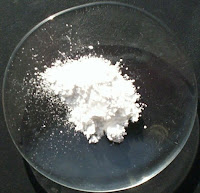 |
| Magnesium oxide |
Magnesium oxide (MgO), or magnesia, is a white hygroscopic solid mineral that occurs naturally. The use of compacted magnesium oxide for electrical insulation in wiring cables, heating cables, tubular heating elements, and thermocouples is well known.
While magnesium oxide is the favored high temperature insulating material, many others have been tested. Some examples are aluminum oxide, crystalline silica, and beryllium oxide. For various reasons, ranging from cost, inferior mechanical, poor electrical, and safety issues, magnesium oxide outperforms other powders in industrial applications.
 |
| MgO cable cutaway |
The MgO thermocouple is constructed by encasing a thermocouple element inside a metal sheath, surrounded by magnesium oxide (MgO). Sheath materials are typically 304 stainless steel, 316 stainless steel, Inconel 600, and 310 stainless steel. The metal sheath is then swaged or drawn down to reduce its diameter. During the drawing process, the powder undergoes considerable compaction, and reaches a compressed density of 70-80% of the crystal density. Despite this change in density, the thermocouples remain very flexible after annealing. Impressively, an MgO thermocouples minimum bend diameter is equal to two times the outside diameter.
 |
| MgO thermocouple |
MgO thermocouples are available in a variety of sensing junctions. Grounded junctions use a thermocouple welded to the sheath and provides fast response, with good thermocouple protection. Ungrounded (isolated) junctions are insulated from sheath with magnesium oxide and are used to prevent electrical interference from affecting the signal and response is slightly slower than grounded junctions. Exposed junctions are not protected by welded end-cap, provide very quick response, but are susceptible to corrosive media. Dual element common junctions have two thermocouples with junctions welded together, and dual element isolated junctions electrically separate in the same sheath.
MgO thermocouples are known for high dielectric strength, durability, malleability and quick response to temperature fluctuations. They can be used for process applications up to 2400°F and, because the measuring junction can also be sealed from the environment, they are recommended for use in high pressure, high moisture, corrosive, and environments.
For more information on
MgO thermocouples, contact
Duro-Sense Corporation at
https://duro-sense.com or by calling 310-533-6877


